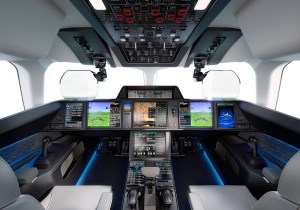The family resemblance between Dassault’s Rafale fighter and its new Falcon 10X business jet is evident—and intentional.
Engineers borrowed heavily from the French airframer’s warbird to give its latest civilian aircraft the crisp handling and short-field capabilities that Dassault’s combat jet is known for. The new Falcon is the largest, most powerful business jet that Dassault has ever designed, created to compete in the ultra-long-range category, which includes recent launches from Bombardier, Gulfstream, Airbus Corporate Jets, and Boeing Business Jets.
An optional rear private suite.
Dassault Aviation
Dassault’s military features are major differentiators between the 10X and its competition in private aviation’s most elite class. “The same aerodynamic specialists are involved in our fighter and Falcon development,” says Carlos Brana, executive vice president of civil aircraft for Dassault. Similar to the Rafale, the 10X has multiple control surfaces on the wings that act independently—commanded by its fly-by-wire system—for greater maneuverability, a feature no other competitor offers. That wing configuration and related software support also give the Falcon the ability to land on shorter runways than others in its class, even with its powerful Rolls-Royce Pearl 10X engines, which deliver a range of 7,500 nautical miles at Mach 0.85 and a top cruising speed of Mach 0.925.
We recently visited the Falcon 10X cabin mock-up, itself a feat of engineering, at Dassault’s delivery hangar in Le Bourget, France. Space and luxury are the focal points of this widest-in-class cabin, the winner of multiple design awards, measuring 109 inches across with 80 inches of headroom. The modular design allows owners to configure each section by size, be it for an executive office, an entertainment space, or a private suite. The cabin boasts 38 windows (each 50 percent larger than those on the Falcon 7X) and a galley resembling a high-end kitchen. As for health-and-wellness support, there’s the 3,000-foot pressurization level at 41,000 feet and advanced air filtration.

The widest-in-class cabin has multiple seating configurations.
Dassault Aviation
Connectivity is also paramount, especially in a jet that can fly nonstop from New York to Shanghai or Los Angeles to Sydney. The onboard FalconConnect system has the latest Honeywell options—including Iridium, Viasat Ka/Ku bands, and Jet ConneX Ka-band—to help ensure that passengers have all the juice they need for both productivity and entertainment.
In the cockpit, the NeXus flight deck contains one of the most advanced degrees of human-machine interface found on any business jet. Brana says that “safety features like the recovery button, which returns the aircraft to level flight,” and the FalconEye vision system, connected to dual head-up displays, will be unique to the 10X. The latter, first used in military jets, provides more visual information, particularly vital for avoiding severe weather or during approaches into mountain airports such as Aspen, where having terrain and runway images directly in the pilot’s view could be indispensable.

The cockpit features the advanced NeXus flight deck.
Dassault Aviation
With the first of three flight-ready examples slated to begin tests this year and deliveries expected in 2027, the Dassault Falcon 10X promises a lofty level of performance and refinement with an alluring bit of fight—a combination sure to make it a top contender in the ultra-long-range ring.
This post was originally published on here







